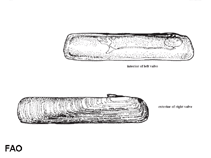Solen obliquus Sprengler, 1794
Antillean razor clam| Native range | All suitable habitat | Point map | Year 2050 |

|
| This map was computer-generated and has not yet been reviewed. |
| Solen obliquus AquaMaps Data sources: GBIF OBIS |
Classification / Names Populärnamn | synonymer | CoL | ITIS | WoRMS
Bivalvia | Adapedonta | Solenidae
Environment: milieu / climate zone / djupintervall / distribution range Ekologi
. Tropical
Distribution Länder | FAO områden | Ekosystem | Förekomster | Utplanteringar
Western Atlantic: Caribbean to Brazil.
Length at first maturity / Size / Weight / Age
Könsmognad: Lm ? range ? - ? cmCommon length : 9.6 cm TL hane/ej könsbestämd; (Ref. 344)
Short description Morfologi
Life cycle and mating behavior Könsmognad | Reproduktion | Lek | Eggs | Fecundity | Larvae
Main reference
referenser | Koordinator | Medarbetare
Leal, J.H. 2003 Bivalves. p. 25-98. In Carpenter, K.E. (ed.). The living marine resources of the Western Central Atlantic. Volume 1: Introduction, molluscs, crustaceans, hagfishes, sharks, batoid fishes, and chimaeras. FAO Species Identification Guide for Fishery Purposes and American Society of Ichthyologists and Herpetologists Special Publication No. 5. 1600p. (Ref. 344)
IUCN Red List Status
(Ref. 130435: Version 2025-1)
CITES status (Ref. 108899)
CMS (Ref. 116361)
Threat to humans
Human uses
Fiskeri: kommersiell
| FishSource |
Verktyg
Ytterligare information
Födosammansättning
Födointag
Predatorer
Max. ages / sizes
Length-weight rel.
Length-length rel.
Length-frequencies
Mass conversion
Abundans
Internet-källor
BHL | BOLD Systems | CISTI | DiscoverLife | FAO(Publication : search) | Fishipedia | GenBank (genome, nucleotide) | GloBI | Gomexsi | Google Books | Google Scholar | Google | PubMed | Tree of Life | Wikipedia (Go, sök) | Zoological Record



